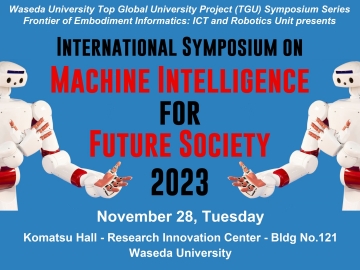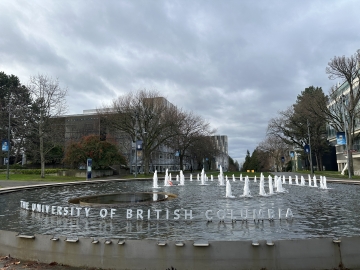As part of the Top Global University Project, the Center for Positive/Empirical Analysis of Political Economy offers our doctoral students a research stay program at leading overseas institutions in collaboration with the Center for Experimental Financial Market (CEFM). This program has started to deepen exchanges with researchers overseas and to provide doctoral students with international research opportunities. In addition, the program is expected to bring us even more exchanges between researchers, the start of joint research, and strong collaboration in graduate school education. Here is a report by Taro Shinoda, who returned to Japan after completing two months of research activities at Ecole Polytechnique (France) this fall.
SHINODA, Taro
D6, Graduate School of Economics
In this report, I describe my research activities at Ecole Polytechnique (hereafter Polytechnique) in France, where I stayed from September 6 to October 27 under the TGU/CEFM research stay program for doctoral students. In addition to reporting on the results of my research, I hope that the information on the stay in France will be helpful to those who will be similarly dispatched to France in the future.
Travel
Because the outbound flight departed from Haneda Airport in the early morning of September 6, I left Matsumoto, Nagano on September 5 and stayed the night before at my parents’ home in Yokohama, Kanagawa. Since it was not possible to fly over Russia, it took 15 hours to arrive at Charles de Gaulle Airport, Paris while viewing the vastness of the Arctic Circle, Greenland and Iceland. I traveled another two hours by train and bus from the airport to reach my place of stay in Massy.
I departed from my lodging in the early afternoon of October 27 on the return trip, and left Charles de Gaulle Airport at 7:00 p.m. on the same day. I arrived at Haneda Airport at around 4:00 p.m. of October 28 and returned to my home in Matsumoto at around 9:00 p.m.
Both outbound and inbound travel was smooth, and there were few additional procedures required due to COVID-19.
Residence
Since this was a two-month long stay, I used the “Airbnb” website instead of staying at a hotel. I stayed in a room of a three-bedroom apartment on the 13th floor of a 14-story apartment building. The room was not large, but the fact that it had a bathroom, toilet, and kitchen inside was a deciding factor. There was a supermarket, bakery, and pharmacy across the street from the apartment, and it was conveniently located so that Polytechnique could be reached by a single bus, about 40 minutes one way.
Research Activities
I basically arrived at Polytechnique between 8:30 and 9:00 a.m., did research until around 5:00 p.m., and then went home on weekdays. I was assigned a shared research room on the 5th floor of the Center for Research in Economics and Statistics (hereafter CREST) as a visitor to Professor Yukio Koriyama. I shared the room with another researcher until late September, but from then I was alone in the room for most of the time.
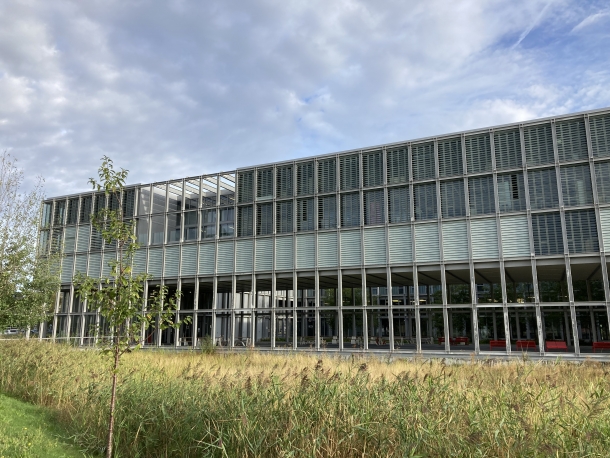
Center for Research in Economics and Statistics (CREST)
In my research activities, I focused on two studies of three-person bargaining experiments that I had conducted in my doctoral program. One is “The Core and the Equal Division Core in a Three-person Unstructured Bargaining Experiment: The Weakest Coalition is Ignored” (hereafter Study 1), which examines the relationship between the core and coalition formation, and the other is “How Does Bargaining Proceed? – A Linguistic Analysis of a Three-Person Unstructured Bargaining Experiment” (hereafter Study 2), which focuses on a linguistic analysis of bargaining process. Study 1 was submitted to two journals but was rejected, so I reviewed my data analysis according to peer review comments and completed a revised manuscript during the dispatch. For Study 2, I mainly proceeded with the analysis of messages sent by the subjects using the chat window during the experiment and completed about 70% of the first draft during the dispatch.
To conduct these studies, I interacted with and received advice from many researchers of Polytechnique. I had discussions with Professor Yukio Koriyama, who accepted me, Professor Guillaume Hollard, Professor Laurent Linnemer, Research Fellow Matias Nunez, and Assistant Professor Yves Le Yaouanq of Polytechnique on how to analyze and present the data in the paper. I also discussed with Ph.D. students Felix Schleef and Ines Picard on each other’s research and deepened exchanges. I received research guidance on writing papers on both studies from my supervisor, Professor Yukihiko Funaki, who had been visiting Polytechnique for about two weeks since mid-September.
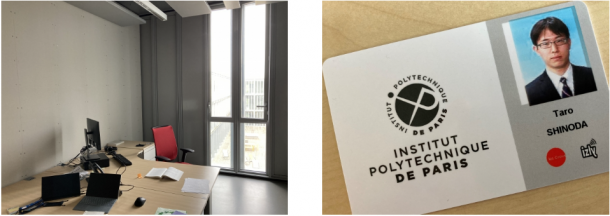
A research room / ID card at Ecole Polytechnique
Presentations
On September 19, at an internal seminar of CREST, both Studies 1 and 2 were combined in a one-hour presentation titled “Two Studies on Three-person Unstructured Bargaining Experiment.” I received many constructive questions and comments from the audience, especially from Professor Koriyama, who gave me advice not only on the content of the studies but also on how to present and answer questions. By letting the participants know about my research at an early stage of the dispatch, it was a good opportunity for the exchanges. This internal seminar was held every Monday in principle, and I attended it as an auditor and listened to other researchers’ presentations during the dispatch.
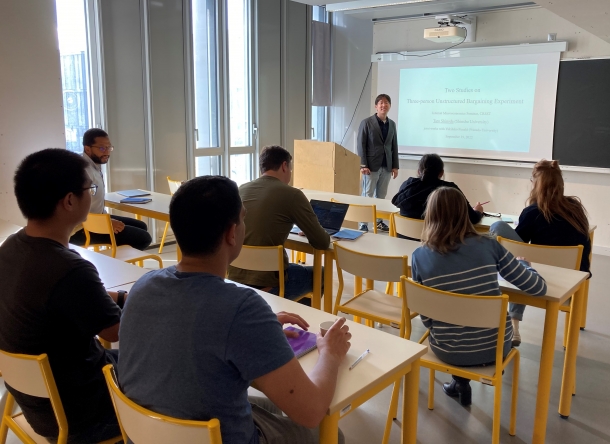
Presentation at an internal seminar of CREST
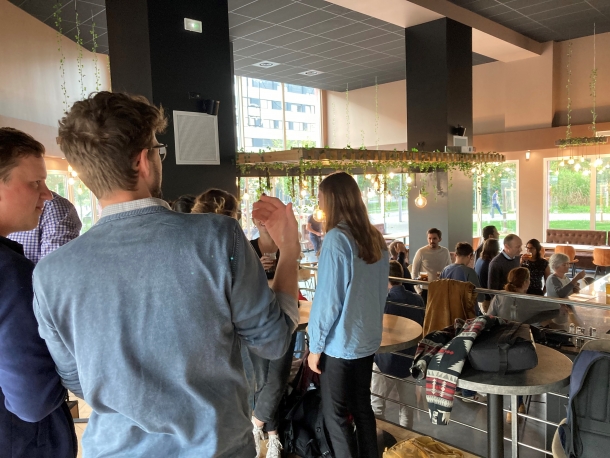
Casual exchange for professors and doctoral students
On September 26 and 27, I participated in the CREST/LESSAC Workshop in Experimental Economics in Dijon, Burgundy. I presented my research entitled “Confidence Game: An Experiment of Psychological Safety.” This is a joint work with Professor Funaki and Assistant Professor Takaaki Abe of Tokyo Institute of Technology, which is being conducted in parallel with Studies 1 and 2. Although this was the first time for me to present the research at a conference, it was well received and I received many constructive comments, mainly about our future experimental plan. I also had a dinner party on the evening of the 26th, where I deepened exchanges with the other participants.
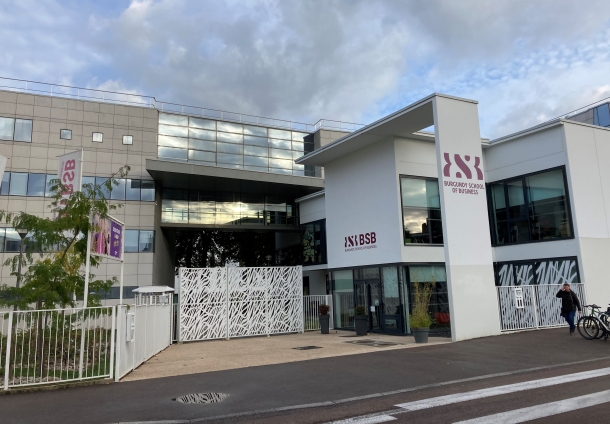
Venue for the Crest/LESSAC Workshop in Dijon
Daily Life
For breakfast, I ate croissants at the bakery across the street from my apartment, and for lunch, I ate sandwiches at the cafeteria on the ground floor of CREST or at a bakery a five-minute walk away. For dinner, I bought food at a supermarket and cooked for myself. Due to the depreciation of Japanese yen, I ate at restaurants only once a week to keep living costs down. French food is delicious, but inevitably I missed the taste of Japan during the dispatch. On such occasions, I ate curry, udon, or ramen noodles that I had brought with me from Japan, which calmed me down somewhat.
In France, a significant percentage of people, especially young people, speak English fluently, so it is possible to live without necessarily speaking French. Instead of renting Wi-Fi from Japan, I used SIM cards valid for 30 days, which can be purchased at kiosks at airports and stations.
In September and October, France was much colder than Japan, with temperatures often falling below 10°C in the mornings and evenings and on rainy days. Perhaps due to the sudden drop in temperature and fatigue from the long trip, I fell ill soon after the dispatch began and suffered from various cold symptoms, including high fever. I purchased antigen test kits at the pharmacy across the street from my apartment and conducted a self-test, but the result was negative, so I took the cold medicine and fever reducers and rested. I was able to obtain the antigen test kit at a much lower price than in Japan.
In mid-October, as the date of my return to Japan approached, I became ill again, and a self-test with an extra test kit that I had bought tested positive, so I was voluntarily quarantined for a week. I suffered from a high fever for the first three days, but after that I was able to live comfortably. In France, few people wear masks in public places or even indoors, so I expected to catch the disease somewhere during my stay, but it was a blessing in disguise that I did not catch it just before returning to Japan. However, even after the period of voluntary quarantine was over, I sometimes suffered from severe headaches, brain fog, and other aftereffects, which forced me to take a rest.
Holidays
I spent my weekends walking around Paris and traveling not only to Paris but also to other cities in France such as Dijon and Lyon to participate in chess tournaments, which I have been doing as a hobby since junior high school. Because it is rare for Japanese people to come to play chess tournaments, I received a very warm welcome wherever I went.
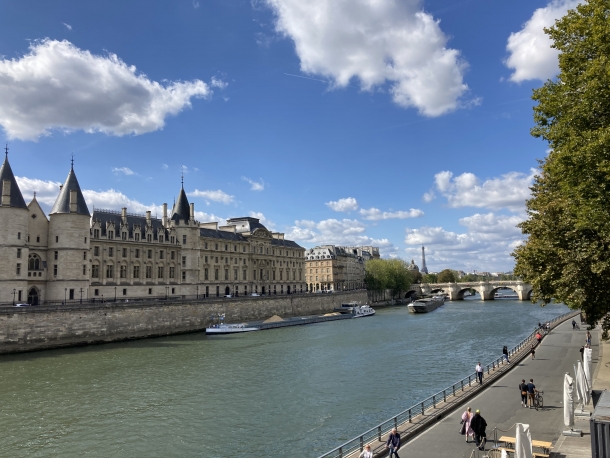
The Seine
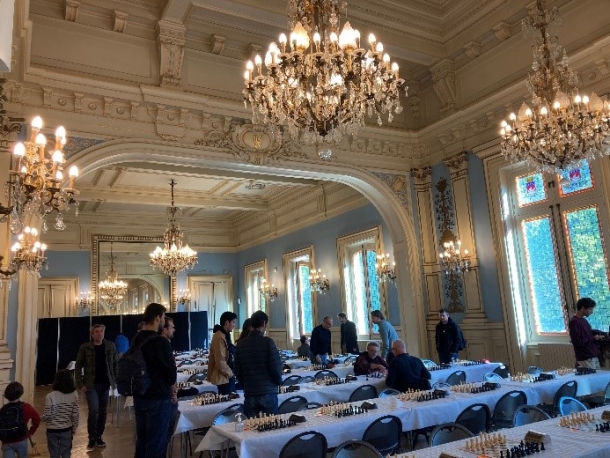
The chess tournament held in Paris
Afterword
Since this was my first opportunity to stay abroad for a long period of time for research purposes, everything I experienced during the dispatch was stimulating and meaningful. I would like to take this opportunity to express my gratitude to my supervisor, Professor Funaki, and to Professor Koriyama for accepting me, as well as to all those who worked so hard to make the dispatch go smoothly.

